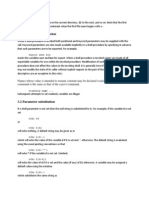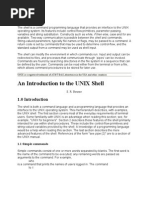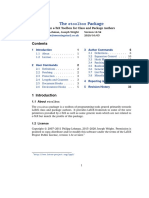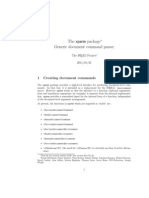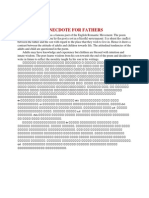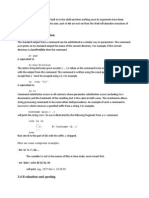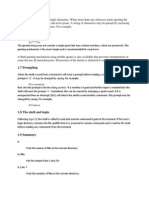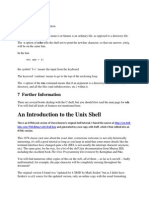2.3 Here Documents
Uploaded by
arunabhatla2.3 Here Documents
Uploaded by
arunabhatla-[xy]) esac
...
The usual quoting conventions apply so that
case $i in \?) ...
will match the character ?.
2.3 Here documents
The shell procedure tel in section 2.1 uses the file /usr/lib/telnos to supply the data for grep. An alternative is to include this data within the shell procedure as a here document, as in,
for i do grep $i <<! ... fred mh0123 bert mh0789 ... ! done
In this example the shell takes the lines between <<! and ! as the standard input for grep. The string ! is arbitrary, the document being terminated by a line that consists of the string following <<.
Parameters are substituted in the document before it is made available to grep as illustrated by the following procedure called edg.
ed $3 <<% g/$1/s//$2/g w %
The call
edg string1 string2 file
is then equivalent to the command
ed file <<% g/string1/s//string2/g w %
and changes all occurrences of string1 in file to string2. Substitution can be prevented using \ to quote the special character $ as in
ed $3 <<+ 1,\$s/$1/$2/g w +
(This version of edg is equivalent to the first except that ed will print a ? if there are no occurrences of the string $1.) Substitution within a here document may be prevented entirely by quoting the terminating string, for example,
grep $i <<\# ... #
The document is presented without modification to grep. If parameter substitution is not required in a here document this latter form is more efficient.
2.4 Shell variables
The shell provides string-valued variables. Variable names begin with a letter and consist of letters, digits and underscores. Variables may be given values by writing, for example,
user=fred box=m000 acct=mh0000
You might also like
- Programming with MATLAB: Taken From the Book "MATLAB for Beginners: A Gentle Approach"From EverandProgramming with MATLAB: Taken From the Book "MATLAB for Beginners: A Gentle Approach"4.5/5 (3)
- Unix Shell Scripting Reference Cheat Crib SheetNo ratings yetUnix Shell Scripting Reference Cheat Crib Sheet4 pages
- Unix Korn Shell Scripting Reference Sheet: Initalization FilesNo ratings yetUnix Korn Shell Scripting Reference Sheet: Initalization Files4 pages
- Allan & Barbara Pease - Abilități de Comunicare-Curtea Veche (2007)No ratings yetAllan & Barbara Pease - Abilități de Comunicare-Curtea Veche (2007)13 pages
- Marking Up Differences Between Latex Files With Latexdiff: PreambleNo ratings yetMarking Up Differences Between Latex Files With Latexdiff: Preamble31 pages
- An Introduction To The UNIX Shell: 1.1 Simple CommandsNo ratings yetAn Introduction To The UNIX Shell: 1.1 Simple Commands27 pages
- Sed Commands: Printing All Lines That Start With A and Ends With BNo ratings yetSed Commands: Printing All Lines That Start With A and Ends With B15 pages
- Unix Shell Scripts: 2.1 Direct InterpretationNo ratings yetUnix Shell Scripts: 2.1 Direct Interpretation8 pages
- Files:: Ls Ls - L Ls - A Esc K More FilenameNo ratings yetFiles:: Ls Ls - L Ls - A Esc K More Filename9 pages
- Ace: A Syntax-Driven C Preprocessor: James Gosling July, 1989No ratings yetAce: A Syntax-Driven C Preprocessor: James Gosling July, 198911 pages
- Sed Command Examples in Linux and Unix How To UseNo ratings yetSed Command Examples in Linux and Unix How To Use24 pages
- List of Special Characters: Note For MS Windows UsersNo ratings yetList of Special Characters: Note For MS Windows Users1 page
- 02 - UNIX - Reading: 1 UNIX Commands For Data ScientistsNo ratings yet02 - UNIX - Reading: 1 UNIX Commands For Data Scientists8 pages
- The L TEX3 Kernel: Style Guide For Code Authors: A TEX3 Project Released 2011/09/07No ratings yetThe L TEX3 Kernel: Style Guide For Code Authors: A TEX3 Project Released 2011/09/075 pages
- The Chet Package: Stergiou@physics - Ucsd.eduNo ratings yetThe Chet Package: Stergiou@physics - Ucsd.edu5 pages
- Chapter 14. Perl - The Master Manipulator IntroducitonNo ratings yetChapter 14. Perl - The Master Manipulator Introduciton13 pages
- Operatingsystem: Library Version: 3.2.2 Library Scope: Named Arguments: SupportedNo ratings yetOperatingsystem: Library Version: 3.2.2 Library Scope: Named Arguments: Supported22 pages
- The Xparse Package. Generic Document Command ParserNo ratings yetThe Xparse Package. Generic Document Command Parser10 pages
- Acknowledgements: Item: Word Input-Output Name Value Simple-Command: Item Simple-Command Item Command: Simple-CommandNo ratings yetAcknowledgements: Item: Word Input-Output Name Value Simple-Command: Item Simple-Command Item Command: Simple-Command2 pages
- September 10, 2007: Linux Hints, Tips, and TricksNo ratings yetSeptember 10, 2007: Linux Hints, Tips, and Tricks1 page
- Apms Recruitment 2012 Roster Wise List of Candidates Allotted TGT - Zone Vi (Venue: Govt. Mahaboobia High School (Girls), Gunfoundry, Hyderbad)No ratings yetApms Recruitment 2012 Roster Wise List of Candidates Allotted TGT - Zone Vi (Venue: Govt. Mahaboobia High School (Girls), Gunfoundry, Hyderbad)12 pages
- September 2, 2007: Simple Network Performance TestNo ratings yetSeptember 2, 2007: Simple Network Performance Test1 page
- September 1, 2007: Retrieving Hardware InformationNo ratings yetSeptember 1, 2007: Retrieving Hardware Information1 page
- Case-Part: Pattern) Command-List Pattern: Word Pattern - Word Else-PartNo ratings yetCase-Part: Pattern) Command-List Pattern: Word Pattern - Word Else-Part3 pages
- 3.5 Error Handling: Execution of A Command (See Also 3.7) May Fail For Any of The Following ReasonsNo ratings yet3.5 Error Handling: Execution of A Command (See Also 3.7) May Fail For Any of The Following Reasons2 pages
- 3.6 Fault Handling: Figure 3. UNIX SignalsNo ratings yet3.6 Fault Handling: Figure 3. UNIX Signals2 pages
- 3.0 Keyword Parameters: 2.10 The Man CommandNo ratings yet3.0 Keyword Parameters: 2.10 The Man Command2 pages
- 1.7 Prompting: / Is Convenient For Quoting Single Characters. When More Than One Character Needs Quoting TheNo ratings yet1.7 Prompting: / Is Convenient For Quoting Single Characters. When More Than One Character Needs Quoting The2 pages
- 1.3 Input Output Redirection: Ls - L FileNo ratings yet1.3 Input Output Redirection: Ls - L File2 pages
- An Introduction To The Unix Shell: 7 Further InformationNo ratings yetAn Introduction To The Unix Shell: 7 Further Information2 pages









